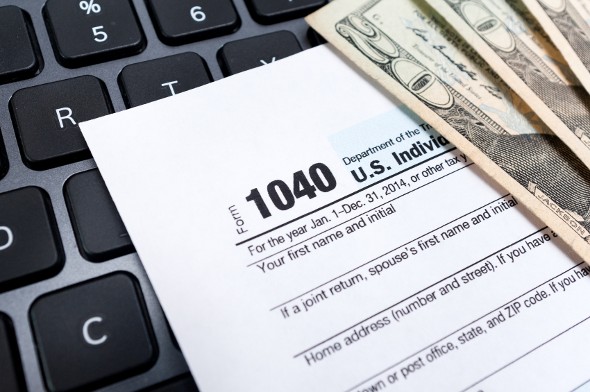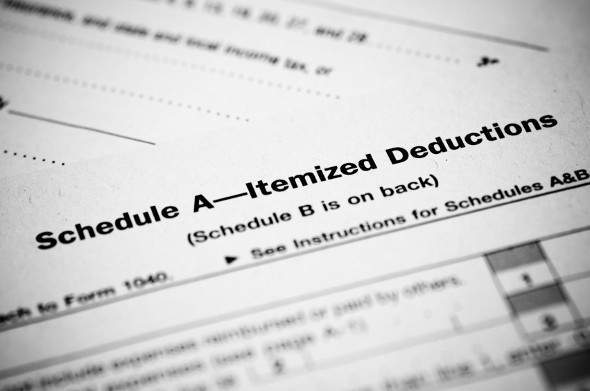
The mortgage interest deduction means that mortgage interest paid on the first $1 million of mortgage debt can be deducted from your taxes through 2025. If you bought your home after December 15, 2017, though, your deduction is capped for interest on the first $750,000 of mortgage debt. Deciding to itemize your taxes could see a large benefit if your mortgage is close to the limit, but you may want to speak to a financial advisor to see if the standard deduction still benefits you more.
How the Mortgage Interest Deduction Works
The mortgage interest deduction was designed to encourage homeownership. While it’s up for debate whether it does so, it does take the sting out of your mortgage payments. Just as landlords can deduct mortgage interest on rental properties they own, anyone who owns property can deduct home mortgage interest from their taxable income, lowering their potential tax bill.
Homeowners who itemize their deductions can deduct their mortgage interest on up to $750,000 of debt from a home purchase (or up to $1 million if you incurred the debt on December 15, 2017 or earlier). The home can be a second one as long as you don’t rent it out or rent it out for only part of the time. You can also claim the deduction for both a primary and second home, up to the cap.
In addition to home mortgage interest, taxpayers can deduct late payment charges, mortgage prepayment penalties and a percentage of any points paid when getting the mortgage. Previously, you could include the interest paid for home equity loans of up to $100,000, regardless of how you spent the borrowed money. Now, you can do so only if you used the money to buy, build or substantially improve your home.
How the Mortgage Interest Deduction May Not Help
The Tax Cuts and Jobs Act (TCJA) significantly raised the standard deduction to $12,200 for single filers and $24,400 for married couples filing jointly. For the 2021 tax year, the standard deduction jumped even higher to $12,550 for single filers and $25,100 for joint filers. Before TCJA took effect, the standard deduction was $6,350 for single filers and $12,700.
One of the goals of Congress in passing TCJA was to make filing taxes easier, and this huge increase makes itemizing deductions, including mortgage interest, unnecessary. For many people, claiming the standard deduction is far more advantageous, tax-wise.
Indeed, it really only pays to claim the mortgage interest deduction if you have a really big mortgage or two mortgages (because you have a second home). In other words, the deduction is a gift to the wealthy in most situations. However, savvy investors might be able to take advantage of this deduction.
What the Critics Say
This has always been part of the criticism of the mortgage interest deduction, but it is even more so, since the TCJA became law. The stated goal of the deduction is to increase homeownership among middle-income Americans. Yet research shows (even before TCJA) that most of the benefits of the mortgage interest deduction go to wealthy families.
This is partly because any itemized tax deduction favors the rich. Unlike a tax credit, a tax deduction is more advantageous the higher up the income ladder you go. If your top tax rate is 37%, a $1,000 reduction in your taxable income is more valuable to you than to someone whose tax rate is 12%. Plus wealthier people buy more expensive homes and are more likely to have a second home. So the amount they deduct is far greater than what middle-class homeowners typically claim.
This brings us to another point of criticism: the deduction doesn’t encourage responsible, affordable homeownership among the middle class. If anything, it encourages middle-class and working-class families to go for “reach” houses and take out bigger mortgages. The financial crisis of 2008 showed us why that can be dangerous.
What Can Be Deducted For Mortgage Interest

If you’re going to use the mortgage interest deduction then it’s important to understand what qualifies as mortgage interest and what the rules might be. The IRS details the qualifications in Publication 936. The seven things that can be deducted as mortgage interest are:
- Interest On a Mortgage For Your Main Home: It does not matter what type of home you have the loan on but the home itself must be collateral for the mortgage. You can even claim the deduction if you get a nontaxable housing allowance from the military or if you receive a mortgage in order to complete a buy-out during a divorce.
- Interest On a Mortgage For Your Second Home: You can deduct interest from as many homes as you would like, as long as you own them and have a mortgage. You don’t have to use the house at all to claim the deduction but the second home rules apply if you rent it out.
- Late Payments: You can deduct late mortgage payment penalties.
- Prepayment Penalties: If you get charged a fee for paying off your mortgage early, these fees can be deducted.
- Mortgage Insurance Premiums: Any insurance you purchase on your mortgage, including private mortgage insurance, qualifies for the deduction. However, there are income limits to make this claim ($109,000 for married filing jointly, or $54,500).
- Home Equity Loan Interest: If you take out a home equity loan to buy, build, or substantially improve your home then you can deduct the interest on that loan.
- Mortgage Points: If you prepaid interest on the mortgage of your main home in the form of points, you can deduct those points.
What Is Not Deductible As Mortgage Interest
There are a few items that are not deductible as part of the mortgage interest deduction. These items aren’t directly related to the mortgage itself and are actually additional costs to consider when purchasing a home. The items that don’t qualify are:
- Settlement costs
- Forfeited deposits or earnest money
- Extra principal payments made on the mortgage
- Title insurance
- Homeowners insurance
- Interest accrued on a reverse mortgage
Bottom Line

If you’re a first-time homebuyer, consider the whole picture, not just the mortgage interest tax break. Think about what your monthly payments will be, about closing costs, transportation costs and maintenance costs. The bigger your mortgage and the higher your income, the more valuable the mortgage interest tax deduction will be to you. That’s not to say that you should buy the most lavish house you can finance though. It’s important to learn from the past and most likely stick to the comfortable affordability limit when you’re making the jump to homeownership.
Tips for Buying a Home
- Both buying a home and figuring out your taxes and potential deductions can be very difficult and time-consuming. You might benefit from having a financial advisor answer your questions on both. Finding a qualified financial advisor doesn’t have to be hard. SmartAsset’s free tool matches you with up to three financial advisors who serve your area, and you can interview your advisor matches at no cost to decide which one is right for you. If you’re ready to find an advisor who can help you achieve your financial goals, get started now.
- Make sure your credit score is in good shape. With a high credit score, you can get lower mortgage rates, which translates to lower monthly mortgage payments.
Photo credit: ©iStock/GetUpStudio, ©iStock/Catherine Lane, ©iStock/emmgunn